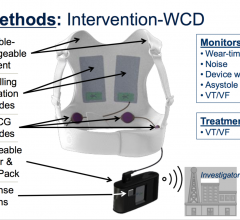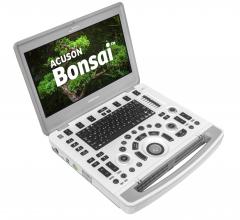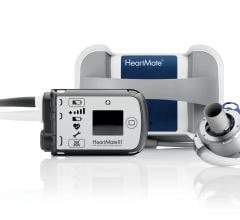The Zoll LifeVest is a temporary, wearable defibrillator designed as a safety net for patients, especially those being ...
After six months of follow-up, women newly diagnosed with breast cancer who were given the beta blocker carvedilol to prevent heart issues while undergoing chemotherapy showed no difference in declines in heart function compared with those taking a placebo. Patients who took carvedilol, however, were significantly less likely to have an elevated marker in the blood that signals injury to the heart, according to a study being presented at the American College of Cardiology’s (ACC) 67th Annual Scientific Session, March 10-12 in Orlando, Fla.
March 14, 2018 — Breast cancer patients who started taking one of two well-known heart medications at the same time they ...
Providing exceptional cardiovascular care for patients to achieve the best possible outcomes is the number one goal for ...
March 13, 2018 – Among patients with persistently high cholesterol despite high-intensity statin therapy, the proprotein ...
March 13, 2018 – Wearing a lightweight vest equipped with a cardioverter defibrillator that detects abnormal heart ...
March 13, 2018 – HeartFlow, Inc. today announced that it has entered into a licensing and technology transfer agreement ...
Cardiac positron emission tomography (PET) is growing in popularity among cardiologists because it provides the ability ...
March 13, 2018 – Infraredx, a company that works in intravascular imaging for mapping coronary artery disease, today ...
At the American College of Cardiology’s (ACC) 67th Annual Scientific Session and Expo, March 10-12 in Orlando, Fla., Siemens Healthineers launched its new portable cardiovascular ultrasound solution, the Acuson Bonsai.
At two years of follow-up, severely ill patients with advanced heart failure who received a novel heart pump fully implantable within the chest experienced no malfunctions requiring replacement or removal of the device for blood clotting. Further, their risk of a stroke was halved compared with patients who received the established version of the pump that requires an abdominal location for the implant, according to research presented at the American College of Cardiology’s 67th Annual Scientific Session, March 10-12 in Orlando, Fla.
When performing radiofrequency (RF) ablation to treat cardiac arrhythmia, medical professionals must balance the safety ...
Medtronic plc unveiled outcomes from the CoreValve U.S. Pivotal Extreme Risk Study and the real-world NOTION trial (Nordic Aortic Valve Intervention Trial) at the American College of Cardiology (ACC) 67th Annual Scientific Sessions, March 10-12, 2018, in Orlando Fla. Both studies examined patients with the CoreValve transcatheter aortic valve replacement (TAVR) system at five years post-implant. Results from the studies demonstrated that patients implanted with the CoreValve TAVR system showed strong hemodynamic performance and improved quality of life out to five years.
Philips announced health economic results from the DEFINE FLAIR clinical trial comparing cost-effectiveness between instant wave-free ratio (iFR) and fractional flow reserve (FFR) in the guidance of treatment of ischemic heart disease at the American College of Cardiology (ACC) annual meeting, March 10–12, 2018, in Orlando, Fla. The study found that an iFR-guided strategy offers a one-year average cost savings of $896 per patient compared to an FFR-guided strategy, while delivering consistent patient outcomes. iFR is a pressure-derived index unique to Philips, allowing a simplified hyperemia-free physiological assessment of coronary blockages.
Philips recently announced the integration of its IntelliVue Guardian with automated Early Warning Scoring (EWS) into the general care units of Saratoga Hospital has helped improve patient safety and clinical outcomes. Since implementing Philips' patient monitoring technology in 2015, Saratoga Hospital has reduced patient transfers to the intensive care unit (ICU) by 63 percent and eliminated patient codes within its 20-bed orthopedic unit, which dropped from three or four codes per year to zero.
Change Healthcare Cardiology Hemodynamics is an integrated hemodynamic monitoring system for monitoring vital signs and ...
March 9, 2018 — At the American College of Cardiology’s 67th Annual Scientific Session and Expo, March 10-12 in Orlando ...
Scranton Gillette Communications’ Diagnostic and Interventional Cardiology (DAIC) was recently named a 2018 Azbee Award ...
Fysicon announced its acquisition by Canon Medical Systems Corporation. Linda Elberse, CEO of Fysicon, stated: "Being part of a major player as Canon Medical Systems Corporation gives us the opportunity to cover all parts of the world with our innovative systems. Now Canon Medical has completed the image by adding Fysicon’s new developed hemodynamic monitoring system “QMAPP”, the sophisticated device management system “DataLinQ” and the cloud based image distribution software “EVOCS" and last but not least Fysicon's knowledge of connectivity and workflow management. Canon Medical is a strong brand name and a leading supplier, which will help us take the next steps into strengthening and growing our footprint in the global market. Furthermore we will keep developing new technologies and exploring new areas in the medical field together with our new parent company. We are very proud to have joined forces!”


 March 14, 2018
March 14, 2018















